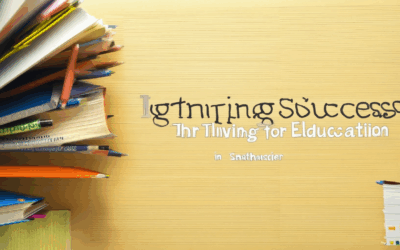Transitioning from high school to college is often cited as one of life’s most significant milestones, yet it can also be one of the most challenging journeys to navigate. Whether it’s mastering new academic expectations, adapting to a rapidly changing social environment, or simply figuring out how to thrive in this unfamiliar setting, the transition to college presents a unique set of challenges that require careful planning and strategies to overcome. In this comprehensive guide, we’ll explore the multifaceted nature of the college transition, offering expert tips to help you not only survive but excel during this pivotal phase of your life. From understanding the keys to academic success to addressing the emotional and social demands of college life, this article delves into the complexities of navigating the transition and provides actionable insights to help you emerge stronger and more prepared for the future.
How to Prepare for the Transition to College
To ensure a smooth transition to college, follow these organized steps:
- Packing Essentials : Create a checklist including clothing, bedding, school supplies, and personal hygiene products. Organize items into categories like essentials, electronics, and seasonal gear.
- Roommate Coordination : Schedule a meeting with roommates to discuss shared responsibilities, space allocation, and item distribution to ensure a harmonious living environment.
- Explore Campus Layout : Familiarize yourself with the college campus, including classrooms, libraries, dining halls, and recreational areas, to navigate efficiently during the first week.
- Connect with Classmates : Engage with future classmates through social media groups or orientation events to build connections and feel more prepared for the academic environment.
- Financial Preparations : Review your financial aid status, set up a budget for tuition, housing, food, and entertainment, and ensure all payments are finalized before departure.
- Health and Safety : Schedule a pre-college health check-up, update vaccinations, and gather medical records. Discuss any health concerns with a counselor to ensure readiness for the academic demands.
- Set Up Living Arrangements : Confirm your on-campus or off-campus housing details, including move-in dates and roommate agreements, to avoid last-minute issues.
- Plan for Commute Routes : Map out public transportation routes or driving directions to and from classes to minimize travel stress.
- Update Emergency Contacts : Inform family and friends about your college address and phone number to ensure they can reach you in case of emergencies.
- Stay Organized : Use a planner or digital calendar to track coursework, exams, and extracurricular activities, ensuring timely submission of assignments and attendance to all important events.
- Mental Preparation : Talk to a counselor or therapist to develop coping strategies for potential stressors, such as adjusting to a new schedule and meeting new challenges.
- Develop a Backup Plan : Prepare for unexpected situations, such as lost keys or internet outages, by having duplicate keys and alternative communication methods ready.
For more detailed guides and resources, visit Enroll Maven to explore comprehensive checklists, tips, and video tutorials tailored to your college transition needs.
Elite Colleges Attended by the Top 1%
The top 1% of students often choose prestigious colleges and universities known for their academic excellence and affluent student bodies. Here are some of the most prominent institutions:
- Harvard University – A member of the Ivy League, Harvard consistently attracts students from wealthy backgrounds due to its rigorous academics and prestigious reputation.
- Yale University – Another Ivy League school, Yale is renowned for its strong academic programs and its ability to draw students from high-income families.
- Princeton University – Located in New Jersey, Princeton is part of the Ivy League and has a long history of admitting students from affluent households.
- Columbia University – Situated in New York City, Columbia is a leading institution that draws a diverse group of students, many from wealthier backgrounds.
- Stanford University – Known for its innovative curriculum and research focus, Stanford attracts students from high-income families nationwide.
- MIT (Massachusetts Institute of Technology) – A world-renowned technological university, MIT has a reputation for welcoming students from affluent families due to its competitive admission standards.
- University of Pennsylvania – As part of the Ivy League, Penn attracts students from wealthy backgrounds with its strong academic offerings and vibrant campus culture.
- Brown University – Located in Rhode Island, Brown is an Ivy League school that has historically drawn students from privileged families.
- Dartmouth College – Known for its strong liberal arts focus, Dartmouth is a prestigious institution that appeals to many high-income students.
- Oxford University – Based in the UK, Oxford is one of the oldest and most prestigious universities globally, attracting students from affluent backgrounds.
- Cambridge University – Another top-tier institution in the UK, Cambridge has a similar appeal to wealthy students seeking a world-class education.
- ETH Zurich – Located in Switzerland, ETH Zurich is a leading technical university that has attracted students from affluent families.
While these schools are often associated with wealth, it’s important to note that many families also consider factors like academic fit, location, and extracurricular opportunities when making decisions. Visiting the campuses and speaking with current students can provide valuable insights into whether these institutions align with their child’s needs and aspirations.
What is the hardest year in college?
The hardest year in college varies greatly depending on individual circumstances, academic major, and personal goals. However, certain factors often make the freshman year particularly challenging due to the transition from high school to college life.
- Academic Pressure: Freshman year is often marked by a significant increase in workload and complexity of courses. Students may struggle with adapting to college-level expectations, managing time effectively, and balancing multiple subjects simultaneously.
- Social Challenges: Adjusting to a new social environment, making new friendships, and navigating campus culture can be overwhelming. Freshmen often face pressures related to fitting in and building social connections.
- Personal Growth: College is a time of significant personal development, and the freshman year can be emotionally taxing as students grapple with identity formation, independence, and decision-making.
- Financial Stress: For many students, the freshman year introduces new financial responsibilities, such as managing bills, paying tuition, and maintaining a part-time job balance. This can lead to added stress and anxiety.
- Support Systems: Establishing a strong support network—whether through friends, family, or academic advisors—is crucial during the freshman year. Without this, students may feel isolated or overwhelmed.
While the freshman year is often highlighted as the most challenging, other years may present unique difficulties depending on the student’s academic track, career goals, and personal circumstances. It’s essential for students to seek support and resources early to navigate these challenges effectively.
Why Are Gen Z Not Going to College?
Generation Z, often seen as tech-savvy and forward-thinking, is making waves by choosing alternative paths over traditional college routes. Here are the key reasons behind this shift:
- Student Debt Burden: Rising tuition fees and loan debts deter many from pursuing higher education. The fear of accumulating massive debt without guaranteed job security is a significant deterrent.
- Changing Job Market: The rapid evolution of industries, driven by technology, leaves many questioning the necessity of a traditional degree. Skills and adaptability are increasingly valued over formal qualifications.
- Alternative Pathways: Certifications, online courses, and vocational training are seen as more efficient ways to acquire job-relevant skills, offering flexibility and quicker outcomes compared to traditional degrees.
- Personal Values and Ambitions: Many Gen Z individuals prioritize personal growth, travel, and entrepreneurial ventures over traditional career trajectories, seeking lives that align more closely with their passions.
- Financial Realities: Economic instability in many households limits the ability to fund college education, making higher studies less accessible for some Gen Z members.
- Gig Economy and Remote Work: The rise of freelancing and side hustles provides viable income streams, reducing the pressure to rely solely on a traditional career path supported by a degree.
- Evolving Perceptions of Education: Greater awareness of the challenges and diminishing returns of college has led to more informed decisions, with Gen Z often opting for pathways that better align with their interests and goals.
Why Do Kids Not Want to Go to College Anymore?
There are several reasons why kids might not want to pursue college anymore. One major factor is the rising cost of education, which has led to increased student debt loads. Many graduates find themselves burdened with loans, making the investment seem less worthwhile.
Additionally, the job market has become more competitive, especially in industries requiring specialized skills. With technological advancements, some believe that hands-on experience or certifications might be more valuable than a traditional degree in certain fields.
Another reason is the perception that college isn’t the only pathway to success. Trade schools, apprenticeships, and online courses are gaining popularity as alternatives, offering practical training and job placement without the high costs and debts associated with traditional college.
Some students also express frustration with the quality of education they receive, feeling that it doesn’t prepare them adequately for the workforce. Online learning has become more prevalent, which some argue lacks the social and networking benefits of traditional campuses.
Furthermore, political and social issues on college campuses can deter students. Controversial curriculums, debates over policies, and negative campus environments may lead some to seek alternative routes for education and career development.
Lastly, work experience and internships often provide valuable skills and income, making some students question the necessity of investing time and money into a four-year degree when they can gain practical knowledge through other means.
Which Generation Goes to College the Most?
Generation Z students currently have the highest college enrollment rates among all generations.
- Generation Z: Approximately 65% of young adults aged 18-24 are enrolled in college or university, reflecting their focus on education and career opportunities.
- Millennials: Around 60% of Millennials attended college, though slightly less than Generation Z due to economic challenges faced during their formative years.
- Generation X: About 55% of Generation X members pursued higher education, with many entering the workforce earlier, impacting their college attendance rates.
- Baby Boomers: While a significant portion of Baby Boomers attended college, their peak enrollment rate was influenced by the GI Bill and post-war economic conditions, reaching approximately 50% in later life.
These trends highlight the evolving priorities and opportunities for each generation, with Generation Z leading in college enrollment due to their unique educational background and career aspirations.









0 Comments